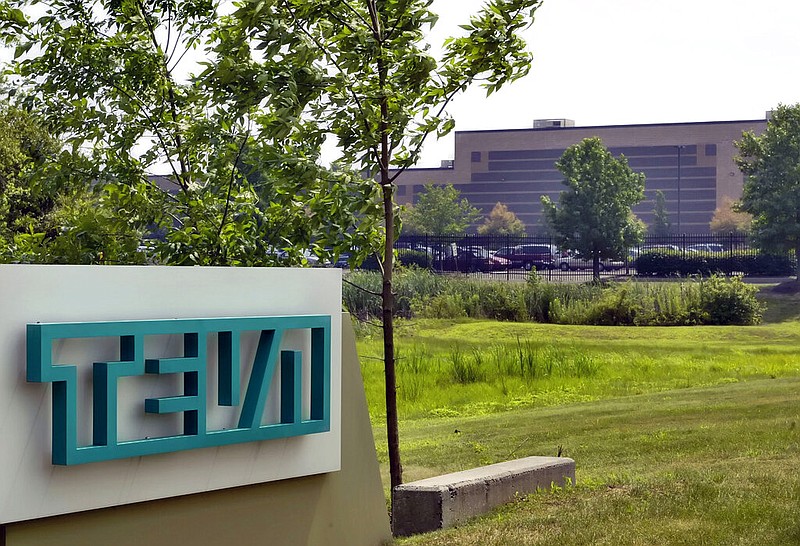NEW YORK -- A jury Thursday ruled that opioid manufacturer and distributor Teva Pharmaceuticals USA Inc. contributed to a public nuisance by inundating New York with pills that killed thousands of people.
Teva and a handful of its subsidiary companies were found liable in a six-month trial that sought to reckon with the role that the pharmaceutical industry played in the opioid epidemic in two hard-hit New York counties and across the state.
New York state was also determined to be partially responsible. A separate trial will follow to determine what Teva will have to pay in the case.
Israel-based Teva, which makes medications using the powerful opioid fentanyl, said it "strongly disagrees" with the verdict and plans to appeal.
"The plaintiffs presented no evidence of medically unnecessary prescriptions, suspicious or diverted orders, no evidence of oversupply" by Teva and didn't show that Teva's marketing caused harm to New Yorkers, the company said in a statement. It is also arguing for a mistrial.
The trial began in June and was argued jointly by New York state, and Suffolk and Nassau counties. The case began with more than two dozen defendants and was the first of its kind to target the entirety of the opioid supply chain: the pharmaceutical companies that manufactured pain pills, the distributors of the drugs and the pharmacy chains that filled the prescriptions. By the time jury deliberations began, it had been whittled down to a handful of defendants, all part of Teva Pharmaceuticals.
"The trial itself has touched four seasons. We started in the spring, summer and of course now we're into the winter," New York state Supreme Court Justice Jerry Garguilo said before the verdict was announced. "It was an ultramarathon."
[Video not showing up above? Click here to watch » arkansasonline.com/1231teva/]
The case was so vast initially that the trial was to be held in the auditorium of a law school on Long Island. There was not a courtroom in Central Islip large enough to fit all the defendants and their legal teams.
The six-member jury was asked to determine whether the companies played a role in perpetuating an ongoing public nuisance, a specific type of legal claim used in many opioid lawsuits to describe the crisis that in the past decade has killed hundreds of thousands of Americans.
Teva is known for making generic drugs, but the lawsuit focused on Actiq and Fentora, two brand-name fentanyl drugs approved for some cancer patients. Teva repeatedly promoted them more broadly for other types of pain, in a "deceptive and dangerous marketing strategy," the lawsuit said.
"They try to say they're selling legal products. The only problem is: They're selling them illegally," lawyer Hunter Shkolnik, who represented Nassau County, said at a virtual news conference Thursday. "The jury saw that what they're doing is wrong."
Last year, more than 100,000 people -- a record number -- died of overdoses of opioids, particularly black-market fentanyl, according to the Centers for Disease Control and Prevention's provisional 2020 data.
Days before the New York trial began, Johnson & Johnson agreed to pay $230 million, and as the months wore on, almost all defendants in the case agreed to multimillion-dollar settlements.
They included three major drug distributors, which settled in July for more than $1 billion combined. That settlement was part of a larger $26 billion agreement to which companies facing lawsuits for their role in the opioid crisis agreed to settle the raft of more than 3,000 lawsuits filed against them by counties, states and tribes across the country.
As the trial came to a finish, there were more settlements. Earlier this month, just before closing arguments began, Allergan, a pharmaceutical company whose best-known product is Botox, was excised after it agreed to a $200 million settlement.
The money from the settlements will be spread to communities hit by the epidemic of opioids to use for addiction treatment and prevention programs. If certain conditions are met, the combined amount could reach $1.7 billion.
The string of agreements left only a single manufacturer of branded and generic opioids, Teva Pharmaceuticals, and a handful of its associated companies, and Anda, a distributor to pharmacies that is a subsidiary of Teva, at trial.
During the trial, attorneys for Suffolk and Nassau counties and New York state showed the jury videos that one company created for an internal sales conference. In the videos, executives spoofed film scenes, including "Austin Powers," where in the voice of villain Dr. Evil, one discussed pushing doctors to prescribe their opioid over a competitor's product. In another, a vice president of sales is spliced into a scene from "A Few Good Men," explaining that sales representatives have quotas: "You can't handle the truth," he says in part. "Quotas have to be exceeded."
On Dec. 13, lawyers for the parent company, Teva, filed a motion asking for a mistrial, in part saying the lawyers for Suffolk County and New York state had falsely suggested to the jury that the content in the video was emblematic of the company's training.
A lawyer for Teva, Harvey Bartle IV, of the firm Morgan Lewis & Bockius LLP, said the videos were not training videos but parodies, merely intended to be humorous. In asking for a mistrial, Bartle argued that the plaintiffs' characterization of the videos violated a previous order from Garguilo to allow the videos to be shown only as parodies.
"Enough is enough. Four years of hard work by this court and the parties, and six months of unprecedented sacrifice by this jury is now all for naught," lawyers for Teva wrote to the court.
But the request for a mistrial was not granted, and the jury began deliberating Dec. 14.
The price of Teva's U.S.-listed stock fell after the verdict was announced, ending down 6.3% at $7.90.
Information for this article was contributed by Sarah Maslin Nir, Jan Hoffman and Lola Fadulu of The New York Times; and by Jennifer Peltz and Deepti Hajela of The Associated Press.

